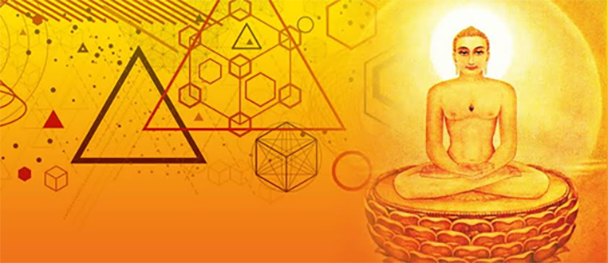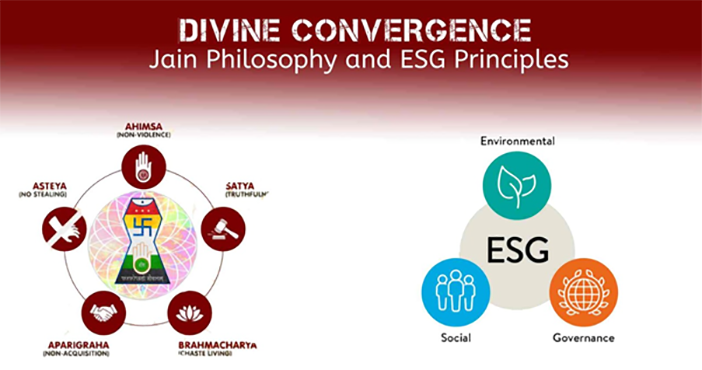Jainavenue is a medium to serve the spiritual path of Jainism

Jainism and Environment
July, 2024 by Kishor B. ShahIt is universally accepted that we are facing an environmental and ecological crisis. The Earth we inhibit is in grave danger, afflicted by rapidly increasing global ecological threats such as the depletion of the ozone layer, global warming, massive deforestation, the extinction of many species and loss of biodiversity, poisonous toxic chemicals and nuclear wastes and exponential population growth. This are all because of mankind’s greed, ignorance, violent and unrestrained exploitation, and use of the Earth’s natural resources.

Maths Magic in Jainism
July, 2024 by Bhavin MehtaJainism has some powerful Mantras like ‘Navkar Mantra’, which is the most powerful than the others. But today we’ll talk about the Mantra composed by the great Acharya Pujya BhadhraBahu Swami, who lived in around 2nd to 4th century AD, ‘Uvasaggaharam Stotra’. It is believed to eliminate obstacles, hardships, and miseries, if chanted with complete faith. This Sutra is associated with its ‘Yantra’, known as ‘Uvasaggaharam Yantra’. At the centre if this Yantra there is a Magical 5×5 Magic Square with many peculiarities and specialities.

Harmony in Diversity: Anekantvada’s Path to Social Justice
July, 2024 by Prof (Dr.) Veenus Jain, and Pallavi MohananIn our modern era of polarized opinions and deep-rooted social challenges, the ancient Jain philosophy of Anekantvada shines as a beacon of wisdom and guidance toward achieving social justice. Embedded within its core are profound teachings on embracing diverse perspectives, cultivating empathy, and striving for holistic understanding. As we navigate complex societal issues and endeavor to build a more equitable world, the principles of Anekantvada offer invaluable insights and potential for transformative change.

A change in diet frees a patient with chronic acid reflux
July, 2024 by Dr. Pritesh MuthaForty-nine-year-old Brian Blackburne of Houston suffered from chronic digestive problems for so long that antacid medicine became a staple of his diet.

Jainism: A Sustainable and Healthy Lifestyle
July, 2024 by Kartik ManiarJainism is an ancient religious and philosophical tradition that originated in India. It is known for its strong emphasis on non-violence (ahimsa), truth (satya), non-possessiveness (aparigraha), and other principles that promote ethical and sustainable living. Here's how Jainism relates to sustainability:

Divine Convergence Jain Philosophy and ESG Principles
July, 2024 by Ankur ChaturvediThe ancient Indian civilization has been a cradle for various philosophies and disciplines that profoundly shape humanity's value systems. Among them, Jainism, an ancient Indian religion founded by Lord Mahavira around the 6th century BCE, holds a significant place. At the core of Jainism lies the principle of ahimsa, or non-violence, which advocates for compassion towards all living beings and fosters harmony and ethical living for spiritual enlightenment.

Publisher’s Desk: Science of Leśyā
June, 2024 by Dilip V. ShahThe Western concept of matter originally applied to the four elements only -fire, earth, air, and water. The Jain concept of elements of the matter is unique in its originality, for it has given place to Indriyas (senses), karmic matter and Leśyā (condition of the soul). Each soul has smell, taste, and one of the six psychic colors called Leśyā. A human soul may take on one of six psychic colors.

Kashayas: Passions in Jainism
June, 2024 by Kishor B. ShahKashayas - Passions in Jainism are the main cause of Karma bondage. Passions distort the true nature of the soul. As long passions are present, the soul will remain in the endless cycle of birth and death. The word Kashaya can be broken down into “Kash”, meaning worldly life and “aya” meaning gain. Therefore, Kashaya means to gain worldly life again and again.

Leśyā and Transmigration of Souls
June, 2024 by Dhruti Ghiya RathiIn Jainism, soul when transmigrating is accompanied by a Karman sharir, per some records Tejas sharir, and by the soul’s Leśyā. Leśyās are defined in three ways: Complexion of the souls, thought tints, mind activities There are six kinds of Leśyā’s defined in the Jain scriptures such as Bhagwati and Uttaradhyayan Sutras. These are further categorized into Asubh (inauspicious) and Shubh (Auspicious) Leśyās. Leśyā being a form of pudgal or matter has a color, taste, smell and touch. They are further divided into Dravya Leśyā and Bhâv Leśyās. The image below shows the six colors that both Dravya and Bhâv Leśyās have.

The Concept of Leśyā in Jainism
June, 2024 by Shruti MaldeThis article is an extract and adaptation of my dissertation for MA in the Study of Religions (Major in Jainism) at the School of Oriental and African Studies (SOAS) in September 2010. The dissertation titled 'The Concept of Leśyā in Jaina Literature' was awarded the Centre of Jain Studies (CoJS) Dissertation Prize in Jaina Studies, sponsored by the N.K. Sethia Foundation through the Institute of Jainology.

Overcoming Kashāyas: A Path to Inner Peace and Spiritual Growth
June, 2024 by Dr. Arihant Kumar JainKashāyas, or passions, are powerful emotions that can hinder our spiritual progress and peace of mind. The word ‘Kashāyas‘ is very widely used in Jain philosophy and is related to the basic karma theory of Jain philosophy. In simple language, the word ‘Kashāyas‘ means the disorders or the toxic emotions arising in one’s mind which keep distorting the mind.

I did my Ayambil in Singapore
June, 2024 by Yifan SingharajaOn April 23rd, 2023, I successfully completed my second Ayambil Oli. Looking ahead, I am considering the possibility of undertaking a longer Ayambil Oli in Southeast Asia or another part of the world. Throughout the experience of participating in Ayambil Oli and upon its completion, I have been greeted with heartfelt blessings such as "Satama" and "Kubh Kubh Annumodana."

